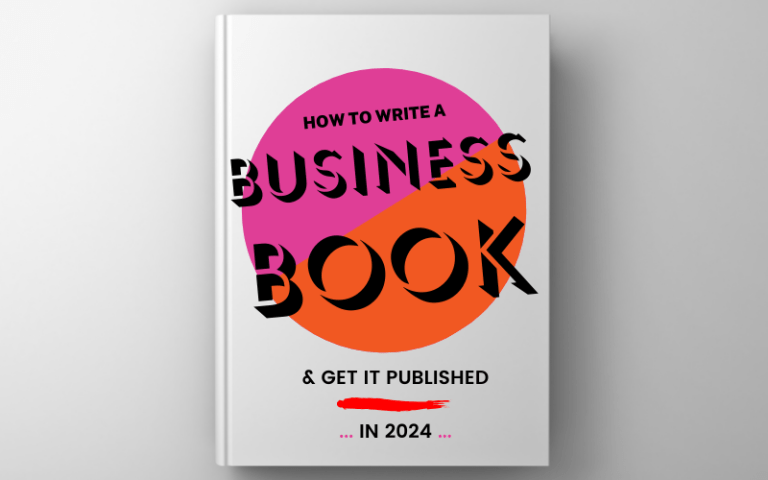How to Write a Business Book – Concept Development
You’ve decided to write a business book. Great! The first step to writing a business book is concept development.
For some people, this might be the easiest step. You might have decided to write a book because in the course of your work you found the message that you need to share. Great! You’re ready to get started.
But for others, you might know the benefit of having a book in your marketing suite, yet, you don’t have a clear idea about what to write about. I’ve actually found with my own authors that the deeper you are in your own expertise, the more often this happens. It’s likely that you actually have many books in you about your niche, and that can make it confusing when you’re looking to get started.
If this is you, then you simply need to make time for concept development.
How to Write a Business Book – Concept Development
When it comes to writing a business book you need to first develop your business book concept. You can do that by:
- Brainstorming a suite of ideas
- Niching down to a single theme
- Creating your initial outline
Brainstorming ideas

If you were trying to come up with ideas for a book of fiction, the process would be quite different. But finding ideas for a book that is part of your business or practice is something that you’re already doing every day.
- Think about your own expertise. To begin brainstorming ideas for writing a business book, start by thinking about all the questions you answer for your clients or customers every day. What is the problem that you solve? What is the insight you provide? What is your unique perspective that keeps your clients coming back to you for help and guidance? You can even check your emails to see what clients are reaching out to you about. Then start jotting the answers to those questions down.
- Talk to your team. There’s no one more deeply ingrained in your business than your team. Talk to them about and find out their thoughts and perspectives to generate ideas for your book.
- Check in with your network. If you’re still looking for more ideas, check in with your network. Ask them what they see as your point of difference? How do they see the work that you do? What do they see as your main areas of expertise?
- Chat to a mentor or coach. Mentors and coaches are deep in your business and will have great insight into some ideas for your book. They’ll also be able to help you with your next step, developing your theme.
- Free writing, mind mapping and other brainstorming activities. If you’re still struggling to find ideas from within your business practices, you can certainly try more traditional brainstorming activities. This might include free writing, mind mapping or rapid ideation.
Nail down your theme
From the suite of ideas that you’ve generated, you’ll now need to distill a central theme. Your theme should act as the north star for your book. That means that it should guide every sentence when writing your business book, whether you’re writing about leadership, innovation or strategic growth (for example).
When choosing your theme, it must resonate with your professional ethos. It needs to align with who you are (or who you want to be) and position you where you want to be within your industry.
Most importantly your theme needs to resonate with your audience. It needs to solve a problem or deliver some perspective-shifting insight that will enhance the trajectory of their own careers or lives. If it doesn’t deliver some value, your audience simply won’t pick the book up.
Some theme examples:
- Customer centricity
- The power of persistence
- The value of integrity in driving sales
- Embracing continuous improvement
Of course, your own theme will come out of your own business and practice. Just make sure its client focused, professionally aligned and value adding and you’re good to go!
Develop an outline
Your final step in the concept development of your book is to draft your outline. Your outline is the roadmap to your book. And when you get this right, you’ll easily be able to navigate through your thoughts, sharing your message while ensuring that each chapter aligns with your central message.
To start your outline, begin by drafting a chapter-by-chapter skeleton. Most book outlines will start with a prologue which sets the scene for the book, often sharing the story (briefly) of who you are and why you’re the one sharing this message.
Then, you can get into each chapter which should build and develop your theme. For each chapter, add bullet points that address your main points, the stories and anecdotes that support those points and (I always appreciate this) the practical steps or actions that your audience can take.
For each chapter keep in mind how these elements interlink and relate to one another. Each step of the way the chapters need to return to, deliver and underscore your theme, creating more and more value for your audience.
End your outline with a concluding wrap up that really drives home your message. As part of this you can (and should definitely consider) adding a paragraph or two about how your business or practice can further help the reader. Remember, your book is part of your marketing collateral, and ending without a CTA would be a missed opportunity.
Consider whether you need to complete some initial research

As part of your concept development process, you might need to complete some initial research. This could be part of your brainstorming, niching down to your theme or even creating your outline. Research can help you find additional information, supporting statistics and case studies and help validate your various points.
Congrats, you have a workable outline!
Now that you’ve completed your concept development tasks you have a workable outline that’s ready to help you when writing your business book. It is your blueprint, one that promises a cohesive and compelling read, grounded in a well-thought-out concept.
Remember that the concept development phase is just as much about discovery as it is about decision-making. It’s where the seed of your book takes root. So, while this might seem like it’s not taking you very far along the path towards having a completed book, it’s actually one of the most important steps.
And now you’re ready for the next step! Let’s get started with some target audience analysis.








3 Comments